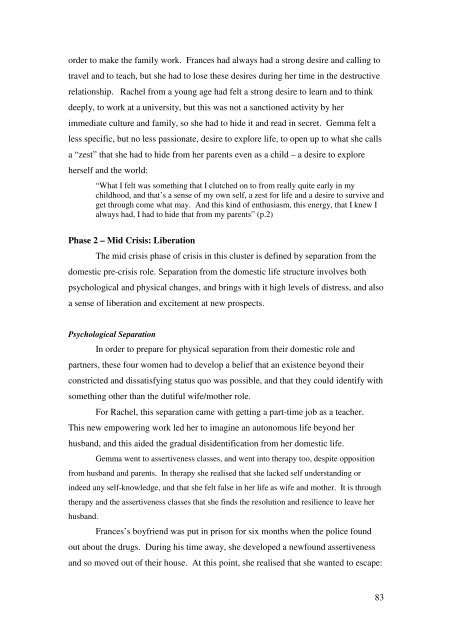DEVELOPMENTAL CRISIS IN EARLY ADULTHOOD: A ...
DEVELOPMENTAL CRISIS IN EARLY ADULTHOOD: A ...
DEVELOPMENTAL CRISIS IN EARLY ADULTHOOD: A ...
You also want an ePaper? Increase the reach of your titles
YUMPU automatically turns print PDFs into web optimized ePapers that Google loves.
order to make the family work. Frances had always had a strong desire and calling to<br />
travel and to teach, but she had to lose these desires during her time in the destructive<br />
relationship. Rachel from a young age had felt a strong desire to learn and to think<br />
deeply, to work at a university, but this was not a sanctioned activity by her<br />
immediate culture and family, so she had to hide it and read in secret. Gemma felt a<br />
less specific, but no less passionate, desire to explore life, to open up to what she calls<br />
a “zest” that she had to hide from her parents even as a child – a desire to explore<br />
herself and the world:<br />
“What I felt was something that I clutched on to from really quite early in my<br />
childhood, and that’s a sense of my own self, a zest for life and a desire to survive and<br />
get through come what may. And this kind of enthusiasm, this energy, that I knew I<br />
always had, I had to hide that from my parents” (p.2)<br />
Phase 2 – Mid Crisis: Liberation<br />
The mid crisis phase of crisis in this cluster is defined by separation from the<br />
domestic pre-crisis role. Separation from the domestic life structure involves both<br />
psychological and physical changes, and brings with it high levels of distress, and also<br />
a sense of liberation and excitement at new prospects.<br />
Psychological Separation<br />
In order to prepare for physical separation from their domestic role and<br />
partners, these four women had to develop a belief that an existence beyond their<br />
constricted and dissatisfying status quo was possible, and that they could identify with<br />
something other than the dutiful wife/mother role.<br />
For Rachel, this separation came with getting a part-time job as a teacher.<br />
This new empowering work led her to imagine an autonomous life beyond her<br />
husband, and this aided the gradual disidentification from her domestic life.<br />
Gemma went to assertiveness classes, and went into therapy too, despite opposition<br />
from husband and parents. In therapy she realised that she lacked self understanding or<br />
indeed any self-knowledge, and that she felt false in her life as wife and mother. It is through<br />
therapy and the assertiveness classes that she finds the resolution and resilience to leave her<br />
husband.<br />
Frances’s boyfriend was put in prison for six months when the police found<br />
out about the drugs. During his time away, she developed a newfound assertiveness<br />
and so moved out of their house. At this point, she realised that she wanted to escape:<br />
83
















